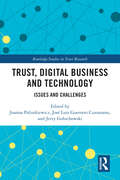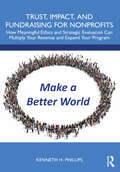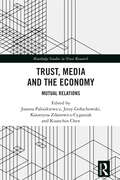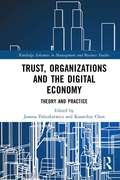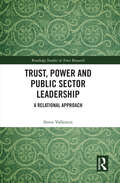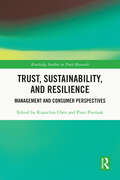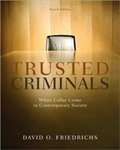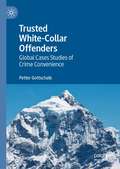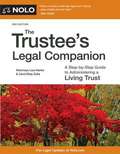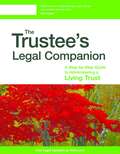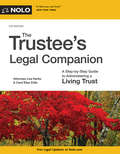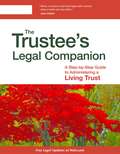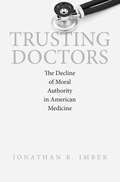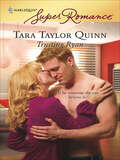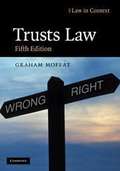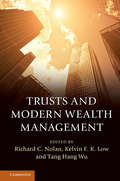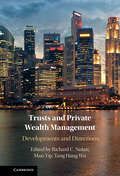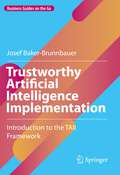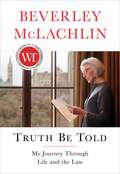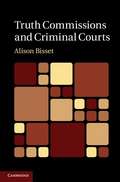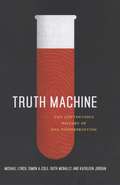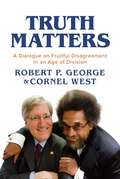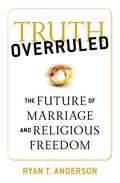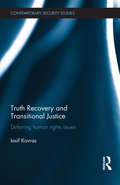- Table View
- List View
Trust, Digital Business and Technology: Issues and Challenges (Routledge Studies in Trust Research)
by Joanna Paliszkiewicz, Jose Luis Guerrero Cusumano, and Jerzy GołuchowskiTrust, Digital Business and Technology: Issues and Challenges presents and discusses the main issues and challenges related to digital trust and information technologies. The subject of trust is relevant to both practitioners and researchers. It is widely recognized and confirmed that trust, especially mutual trust, when it is built at the right level, reduces the risk of interaction and increases the collaboration between partners. Readers will gain from this book theoretical and practical knowledge on digital trust; theoretically, well-grounded knowledge on digital trust and related concepts, empirically validated by practice. Most authors have taken innovative approaches to consider issues highlighting a selected aspect of the core theme of this book. The intended audiences of this book are professionals, scholars, and students.
Trust, Impact, and Fundraising for Nonprofits: How meaningful ethics and strategic evaluation can multiply your revenue and expand your program
by Kenneth H. PhillipsDistilling decades of leadership expertise into an effective framework, this is a practical guidebook for nonprofits around the globe, with practical recommendations for the urgently needed steps to make this a better world. Charities in the United States and NGOs globally need to overcome two glaring and persistent weaknesses in the eyes of potential donors: trustworthiness and effectiveness. After examining possible causes for these deficits, fundraising and organizational development guru Ken Phillips guides readers through the process that leads to greater trust and respect by donors, better results for beneficiaries, significantly increased funding, and better and bigger programs. Alongside helpful worksheets, he presents seven steps to make sure ethics are meaningful, eight disciplines to ensure programs achieve good results, and a communications approach to demonstrate responsibility and accountability, all interwoven with inspiring case studies from his own international experience and other organizations’ stories. Staff and volunteers at registered nonprofits around the world, as well as any individual or group raising funds more informally, will value this guide to empower organizations to win trust, raise more funds, and achieve greater program impact.
Trust, Media and the Economy: Mutual Relations (Routledge Studies in Trust Research)
by Jerzy Gołuchowski Joanna Paliszkiewicz Kuanchin Chen Katarzyna Zdanowicz-CyganiakTrust, Media and the Economy: Mutual Relations delves into the critical relationships between trust, media, and economic behavior. This book explores how trust in media influences economic decisions and how economic conditions impact media trustworthiness. Divided into two parts, it first examines the role of trust within media channels, addressing topics such as the impact of clickbait, the role of user-generated content, and trust dynamics across generations. The second part focuses on how trusted communication affects economic outcomes, discussing social media’s role in economic communication, the influence of financial influencers, and trust-based marketing.The book features case studies from around the world, including Poland, France, and the United States, providing a broad geographical perspective. It includes topical issues such as the trust dynamics in YouTube communities and greenwashing practices. The contributors’ diverse expertise ensures a comprehensive analysis that is accessible to non-specialists, making it a valuable resource for booksellers, librarians, and general readers interested in media and economics. By shedding light on these interactions, the book offers groundbreaking insights into developing more reliable media practices and stronger economic trust foundations.
Trust, Organizations and the Digital Economy: Theory and Practice (Routledge Advances in Management and Business Studies)
by Joanna PaliszkiewiczTrust is a pervasive catalyst of human and business relationships that has inspired interest in researchers and practitioners alike. It has been shown to enhance engagement, communication, organizational performance, and online activities. Despite its role to cultivate cooperation, knowledge-sharing, and innovation, trust through digital means or even trust in digital media has presented new opportunities and challenges in society. Examples include a wider and faster dissemination of trust-influencing messages, and richer options of digital cues that engage, disrupt, or even transform how trust is formulated. Despite that, trust helps people to live through risky and uncertain situations, and the many capabilities enabled on the digital platforms have made the formation and sustaining of trust very different compared to traditional means. Trust in today’s digital environment plays an important role and is intertwined with concepts including reliability, quality, and privacy. This book aims to bring together the theory and practice of trust in the new digital era and will present theoretical and practical foundations. Trust is not given; we must work to build it, but it is a very fragile and intangible asset once built. It is easy to destroy and challenging to rebuild. Researchers, academics, and students in the fields of management, responsibility, and business ethics will gain knowledge on trust and related concepts, learn about the theoretical underpinnings of trust and how it sustains itself through digital dissemination, and explore empirically validated practice regarding trust and its related concepts.
Trust, Power and Public Sector Leadership: A Relational Approach (Routledge Studies in Trust Research)
by Steen VallentinTrust, Power and Public Sector Leadership: A Relational Approach provides a critical theoretical treatment of trust in the realm of public management and governance. The public trust agenda is an antidote to rampant bureaucratic control and, in particular, the marketization and instrumentalization associated with New Public Management. The book approaches trust from a relational perspective that draws on insights from trust research, modern sociology and organization and management theory, while lending support to developments in New Public Governance. It provides a theoretical framework that distinguishes between institutional, economic, moral and relational trust and shows how a relational perspective is able to incorporate insights from the other paradigms in an inclusive approach to trust processes. Apart from providing a theoretical reading of the workings of trust in public organizations, the book addresses how trust relates to power and control along with notions of debureaucratization, post-bureaucratic organization and post-heroic leadership. It also shows how the trust agenda, in theory and practice, is related to social capital and thus efforts to strengthen social relations and collaboration in and around public organizations. Speaking of practice, the book takes its empirical point of departure in the Danish public sector. However, the aim of the book is not to promote the "High trust" Danish case as a benchmark or best practice. The aim is to theorize and help make sense of this particular experience by applying general theory to it and extracting general insights – with broader application – from its particular manifestations and outcomes. There is a need for more elaborate theorizing about trust and power in a public sector setting, and the Danish experience is useful as a starting point for this ambition.
Trust, Sustainability, and Resilience: Management and Consumer Perspectives (Routledge Studies in Trust Research)
by Piotr Pietrzak Kuanchin ChenTrust, Sustainability, and Resilience: Management and Consumer Perspectives offers a comprehensive exploration of the key concepts shaping today’s world. This book examines the complex relationship between trust, sustainability, and resilience across various domains, providing insights into their significant implications for both organizations and consumers. Readers will gain a deeper understanding of the theoretical foundations and practical applications of these concepts from both management and consumer perspectives. Structured into two parts: the first part explores management perspectives, highlighting key issues and strategies, while the second part delves into consumer perspectives, examining the role of trust, sustainability, and resilience in shaping consumer behavior and preferences. This book is essential reading for academics, researchers, and practitioners interested in the intersection of trust, sustainability, and resilience. It provides valuable guidance for business leaders and policymakers seeking to integrate these principles into organizational strategies. Consumers and individuals interested in sustainable practices and responsible consumption will also find this book insightful. Whether studying management, environmental stewardship, or social sciences, this book offers a multidisciplinary approach to understanding and implementing trust, sustainability, and resilience principles for a better tomorrow.
Trusted Criminals: White Collar Crime in Contemporary Society,Fourth Edition
by David O. FriedrichsThis book is a comprehensive guide that covers topics ranging from the problems involved in studying white collar crimes to the principal focus of the crimes to the character of the legal and criminal justice response to the crime.
Trusted White-Collar Offenders: Global Cases Studies of Crime Convenience
by Petter GottschalkThis book uses global case studies of white-collar crime to examine offenders in top business positions and their motives. Drawing on the theory of convenience, this book opens up new perspectives of white-collar offenders in terms of their financial motives, their professional opportunities, and their personal willingness for deviant behaviour. It focusses on three groups of privileged individuals who have abused their positions for economic gain: people who occupied the position of chair of the board, people who were chief executive officers, and female offenders in top positions, and the related white-collar crimes. Convenience themes are identified in each case using the structural model for convenience theory. The case studies are from Denmark, Germany, Japan, Moldova, Norway, Sweden, and the United States. This book speaks to those interested in white-collar crime, criminal justice, policing, organizational behaviour and business administration.
Trustee's Legal Companion, The
by Carol Elias Zolla AttorneyYou're the trustee -- what now? It's an honor to be entrusted with wrapping up the affairs of a deceased loved one, but it's also a big task, one you may find stressful and confusing. The Trustee's Legal Companion shows you exactly how to proceed, keeping in mind the legal, personal and practical aspects of administering a living trust -- all within the terms of the trust and your state's law. You'll learn exactly how to proceed once you're named as a trustee, including handling paperwork, keeping beneficiaries informed, deciding when and if to call in professionals, and how to work with them once they've been hired. Find out about: . what the job of trustee entails . determining whether or not to take the job . finding and working with legal and tax experts . what to do with assets that should be in the trust but aren't . subtrust funding . managing an ongoing trust . paying debts and taxes . keeping good records and avoiding challenges to your actions . terminating the trust Unlike any other legal guide on the market, The Trustee's Legal Companion is written with both the legal and the human element of the job in mind. It will help you gain peace of mind during a difficult time, while saving you time, money, and headaches.
Trustee's Legal Companion, The
by Liza Hanks Attorney Carol Elias Zolla AttorneyIt's an honor to be entrusted with wrapping up the affairs of a deceased loved one, but it's also a big task, one you may find stressful and confusing. The Trustee's Legal Companion shows you exactly how to proceed, keeping in mind the legal, personal and practical aspects of administering a living trust -- all within the terms of the trust and your state's law. You'll learn exactly how to proceed once you're named as a trustee, including handling paperwork, keeping beneficiaries informed, deciding when and if to call in professionals, and how to work with them once they've been hired. Find out about: what the job of trustee entails determining whether or not to take the job finding and working with legal and tax experts what to do with assets that should be in the trust but aren't subtrust funding managing an ongoing trust paying debts and taxes keeping good records and avoiding challenges to your actions terminating the trust Unlike any other legal guide on the market, The Trustee's Legal Companion is written with both the legal and the human element of the job in mind. It will help you gain peace of mind during a difficult time, while saving you time, money, and headaches.
Trustee's Legal Companion, The: A Step-by-Step Guide to Administering a Living Trust
by Liza Hanks Carol Elias ZollaYou’re the trustee. Now what? Living trusts are popular estate planning tools, but when you’re chosen to serve as a trustee, you might wonder where to begin. . The Trustee’s Legal Companion has everything you need to get organized, get started, and get the job done. You’ll learn how to: decide whether to take on the job of trustee set up ongoing trusts for surviving spouses, children, or beneficiaries with special needs invest trust assets get help from lawyers, financial planners, and other experts handle taxes and prepare accountings work effectively with beneficiaries, and distribute trust property. The authors—attorneys who have helped many a bewildered trustee—show you, step by step, how to administer a living trust with confidence.
Trustee's Legal Companion, The: A Step-by-Step Guide to Administering a Living Trust
by Liza Hanks Attorney Carol Elias Zolla AttorneyServing as the trustee of a living trust after someone has died can be a big task—and you probably wonder just where you’re supposed to start. The Trustee’s Legal Companion contains the help you need to get organized, get moving, and do a good job. You’ll learn how to: decide whether or not to take on the job of trustee set up ongoing trusts for the surviving spouse, children or someone with a disability invest trust assets get help from lawyers, accountants, financial planners and other experts prepare accountings handle taxes develop good relationships with beneficiaries, and distribute trust property. Unlike any other legal guide on the market, The Trustee’s Legal Companion is written with both the legal and the human element of the job in mind. It will help you gain peace of mind during a difficult time, while saving you time, money, and headaches. The authors, attorneys who have helped many bewildered trustees, show you, step by step, how to go through the process with confidence.
Trusting Doctors
by Jonathan B. ImberFor more than a century, the American medical profession insisted that doctors be rigorously trained in medical science and dedicated to professional ethics. Patients revered their doctors as representatives of a sacred vocation. Do we still trust doctors with the same conviction? In Trusting Doctors, Jonathan Imber attributes the development of patients' faith in doctors to the inspiration and influence of Protestant and Catholic clergymen during the nineteenth and early twentieth centuries. He explains that as the influence of clergymen waned, and as reliance on medical technology increased, patients' trust in doctors steadily declined. Trusting Doctors discusses the emphasis that Protestant clergymen placed on the physician's vocation; the focus that Catholic moralists put on specific dilemmas faced in daily medical practice; and the loss of unchallenged authority experienced by doctors after World War II, when practitioners became valued for their technical competence rather than their personal integrity. Imber shows how the clergy gradually lost their impact in defining the physician's moral character, and how vocal critics of medicine contributed to a decline in patient confidence. The author argues that as modern medicine becomes defined by specialization, rapid medical advance, profit-driven industry, and ever more anxious patients, the future for a renewed trust in doctors will be confronted by even greater challenges. Trusting Doctors provides valuable insights into the religious underpinnings of the doctor-patient relationship and raises critical questions about the ultimate place of the medical profession in American life and culture.
Trusting Ryan
by Tara Taylor QuinnA heated case—and a surprise age gap—drive a wedge between an older lawyer and a younger cop in this romance by a USA Today–bestselling author.A dedicated cop in the Special Victims Bureau, Ryan Mercedes has a trusted friend in lawyer-advocate Audrey Lincoln. Her compassion is the perfect counterpoint to his hard-driving fight for justice. And this good relationship only gets better the night they cross the line from friends to lovers.But they’re up against seemingly insurmountable obstacles that could divide them for good. Worse—now she and Ryan are on opposite sides of a controversial case. Can they trust enough to resolve their differences and find their way back to each other?
Trusts Law
by Graham Moffat Gerry Bean Rebecca Probert Graham Moffat Gerry BeanAlways the serious student's choice of a Trusts Law textbook, this new edition once again provides a clear examination of the rules in the detail required by the advanced undergraduate. This fifth edition retains its hallmark combination of a contextualized approach and a commercial focus. The authors' commentary has been increased throughout this new edition whilst the fresh design clearly highlights the cases and materials extracts. Recent statutory developments, such as the Charities Act 2006, and the impact of a wealth of new cases are explored, the examination of the law of trusts and taxation is restructured and comparative examples help students understand the new directions being taken in the areas of trust law and equitable remedies. Trusts Law brings a modern perspective to a subject often perceived as traditional, with suggestions for further reading guiding the student to contemporary debates.
Trusts Law: Text and Materials
by Graham Moffat Gerry Bean Rebecca ProbertAlways the serious student's choice of a Trusts Law textbook, this new edition once again provides a clear examination of the rules in the detail required by the advanced undergraduate. This fifth edition retains its hallmark combination of a contextualized approach and a commercial focus. The authors' commentary has been increased throughout this new edition whilst the fresh design clearly highlights the cases and materials extracts. Recent statutory developments, such as the Charities Act 2006, and the impact of a wealth of new cases are explored, the examination of the law of trusts and taxation is restructured and comparative examples help students understand the new directions being taken in the areas of trust law and equitable remedies. Trusts Law brings a modern perspective to a subject often perceived as traditional, with suggestions for further reading guiding the student to contemporary debates.
Trusts and Modern Wealth Management
by Richard C. Nolan Kelvin F. Low Tang Hang WuTrust law has grown and developed over recent years through the continued ingenuity of practitioners and the provision of innovative new trust laws by offshore jurisdictions. The wealth managed through the medium of trust law has also changed in recent years, as increasingly it has come from the newly rich of Asia. This brings distinctive issues to the fore: the role of settlors, family members and trusted advisors in trust administration; the position of trustees in relation to instructions coming from such persons; and an increased desire for confidentiality in trust administration and the settlement of trust disputes. This collection focuses on trusts which are deliberately created to manage wealth and the concomitant issues such trusts raise in other areas of law. Essays from leading members of the judiciary, practitioners and academics explore these developments and their implications for the users of trust law and for society in general.
Trusts and Private Wealth Management: Developments and Directions
by Richard C. Nolan Tang Hang Wu Man YipThere has been insufficient literature focusing on the world-changing rise of Asian wealth. Private wealth in Asia is very substantial, with 33 per cent of the global population of high-net-worth individuals based in Asia. Yet, there is a dearth of legal analysis of Asian wealth, particularly by texts written in English. This collection aims to fill that gap, with chapters on legal issues in relation to Asian wealth transmission, investments in international real estate, familial disputes, family offices and private trust companies. A substantive section of this book also focuses on the changing legal context with chapters exploring trusts and cryptoassets, constructive trust, trustee's discretion and decision-making, changing regulatory environment and abuse of trust structures. This collection of essays on trusts and wealth management presents a focus on Asian wealth and the changing legal context, and follows the related publication, Trusts and Modern Wealth Management (Cambridge University Press, 2018).
Trustworthy Artificial Intelligence Implementation: Introduction to the TAII Framework (Business Guides on the Go)
by Josef Baker-BrunnbauerRapidly developing Artificial Intelligence (AI) systems hold tremendous potential to change various domains and exert considerable influence on societies and organizations alike. More than merely a technical discipline, AI requires interaction between various professions. Based on the results of fundamental literature and empirical research, this book addresses the management’s awareness of the ethical and moral aspects of AI. It seeks to fill a literature gap and offer the management guidance on tackling Trustworthy AI Implementation (TAII) while also considering ethical dependencies within the company. The TAII Framework introduced here pursues a holistic approach to identifying systemic ethical relationships within the company ecosystem and considers corporate values, business models, and common goods aspects like the Sustainable Development Goals and the Universal Declaration of Human Rights. Further, it provides guidance on the implementation of AI ethics in organisations without requiring a deeper background in philosophy and considers the social impacts outside of the software and data engineering setting. Depending on the respective legal context or area of application, the TAII Framework can be adapted and used with a range of regulations and ethical principles. This book can serve as a case study or self-review for c-level managers and students who are interested in this field. It also offers valuable guidelines and perspectives for policymakers looking to pursue an ethical approach to AI.
Truth Be Told: My Journey Through Life and the Law
by Beverley McLachlinFormer Chief Justice of the Supreme Court of Canada Beverley McLachlin offers an intimate and revealing look at her life, from her childhood in the Alberta foothills to her career on the Supreme Court, where she helped to shape the social and moral fabric of the country.As a young girl, Beverley McLachlin’s world was often full of wonder—at the expansive prairie vistas around her, at the stories she discovered in the books at her local library, and at the diverse people who passed through her parents’ door. While her family was poor, their lives were rich in the ways that mattered most. Even at a young age, she had an innate sense of justice, which was reinforced by the lessons her parents taught her: Everyone deserves dignity. All people are equal. Those who work hard reap the rewards. Willful, spirited, and unusually intelligent, she discovered in Pincher Creek an extraordinary tapestry of people and perspectives that informed her worldview going forward. Still, life in the rural Prairies was lonely, and gaining access to education—especially for girls—wasn’t always easy. As a young woman, McLachlin moved to Edmonton to pursue a degree in philosophy. There, she discovered her passion lay not in academia, but in the real world, solving problems directly related to the lives of the people around her. And in the law, she found the tools to do exactly that. She soon realized, though, that the world was not always willing to accept her. In her early years as an articling student and lawyer, she encountered sexism, exclusion, and old boys’ clubs at every turn. And outside the courtroom, personal loss and tragedies struck close to home. Nonetheless, McLachlin was determined to prove her worth, and her love of the law and the pursuit of justice pulled her through the darkest moments. McLachlin’s meteoric rise through the courts soon found her serving on the highest court in the country, becoming the first woman to be named Chief Justice of the Supreme Court of Canada. She rapidly distinguished herself as a judge of renown, one who was never afraid to take on morally complex or charged debates. Over the next eighteen years, McLachlin presided over the most prominent cases in the country—involving Charter challenges, same-sex marriage, and euthanasia. One judgment at a time, she laid down a legal legacy that proved that fairness and justice were not luxuries of the powerful but rather obligations owed to each and every one of us. With warmth, honesty, and deep wisdom, McLachlin invites us into her legal and personal life—into the hopes and doubts, the triumphs and losses on and off the bench. Through it all, her constant faith in justice remained her true north. In an age of division and uncertainty, McLachlin’s memoir is a reminder that justice and the rule of law remain our best hope for a progressive and bright future.
Truth Commissions and Criminal Courts
by Alison BissetThis detailed evaluation of the relationship between trials and truth commissions challenges their assumed compatibility through an analysis of their operational features at national, inter-state and international levels. Alison Bisset conducts case-study analyses of national practice in South Africa, East Timor and Sierra Leone, evaluates the problems posed by the International Criminal Court and considers the challenges presented by the possibility of bystander state prosecutions. At each level, she highlights potential operational conflicts and formulates targeted proposals to enable effective coexistence.
Truth Machine: The Contentious History of DNA Fingerprinting
by Michael Lynch Simon A. Cole Kathleen Jordan Ruth McnallyDNA profiling--commonly known as DNA fingerprinting--is often heralded as unassailable criminal evidence, a veritable "truth machine" that can overturn convictions based on eyewitness testimony, confessions, and other forms of forensic evidence. But DNA evidence is far from infallible. It is subject to the same possibilities for error--in sample collection, forensic analysis, and clerical record keeping--as any other aspect of criminal justice practice. Truth Machine traces the controversial history of DNA fingerprinting by looking at court cases in the United States and United Kingdom beginning in the mid-1980s, when the practice was invented, and continuing until the present. Using interviews, observations of courtroom trials and laboratory processes, and documentary reconstruction, the authors provide a nuanced, theoretically sophisticated, and original ethnographic account of DNA fingerprinting and its evolution. Ultimately, Truth Machine presents compelling evidence of the obstacles and opportunities at the intersection of science, technology, sociology, and law.
Truth Matters: A Dialogue on Fruitful Disagreement in an Age of Division
by Cornel West Robert P. GeorgeTwo leading public intellectuals and dear friends—one progressive, one conservative—explore What is Truth? and Why Does Truth Matter?In Truth Matters, Cornel West and Robert P. George address a range of social issues on which Americans today are bitterly divided. Their book models robust intellectual engagement and civil discourse as they explore vital questions surrounding the idea of truth and its foundational role in our lives. Along the way, they reflect on social conditions—such as respect for freedom of speech—that must be established and maintained if truth is to be seriously pursued. They also explore the virtues—such as intellectual humility and courage—that must be acquired and practiced if we frail, fallible, fallen human beings are to be determined truth seekers and bold truth speakers.
Truth Overruled: The Future of Marriage and Religious Freedom
by Ryan T. Anderson"Every leader in America needs to read this book! It's by far the best summary of what's at stake. " --Rick Warren The Supreme Court has issued a decision, but that doesn't end the debate. Now that the Supreme Court has ruled, Americans face momentous debates about the nature of marriage and religious liberty. Because the Court has redefined marriage in all 50 states, we have to energetically protect our freedom to live according to conscience and faith as we work to rebuild a strong marriage culture. In the first book to respond to the Supreme Court's decision on same-sex marriage, Ryan Anderson draws on the best philosophy and social science to explain what marriage is, why it matters for public policy, and the consequences of its legal redefinition. Attacks on religious liberty--predicated on the bogus equation of opposition to same-sex marriage with racism--have already begun, and modest efforts in Indiana and other states to protect believers' rights have met with hysterics from media and corporate elites. Anderson tells the stories of innocent citizens who have been coerced and penalized by the government and offers a strategy to protect the natural right of religious liberty. Anderson reports on the latest research on same-sex parenting, filling it out with the testimony of children raised by gays and lesbians. He closes with a comprehensive roadmap on how to rebuild a culture of marriage, with work to be done by everyone. The nation's leading defender of marriage in the media and on university campuses, Ryan Anderson has produced the must-read manual on where to go from here. There are reasonable and compelling arguments for the truth about marriage, but too many of our neighbors haven't heard them. Truth is never on "the wrong side of history," but we have to make the case. We will decide which side of history we are on.
Truth Recovery and Transitional Justice: Deferring human rights issues (Contemporary Security Studies)
by Iosif KovrasThis book investigates why some societies defer transitional justice issues after successful democratic consolidation. Despite democratisation, the exhumation of mass graves containing the victims from the violence in Cyprus (1963-1974) and the Spanish civil war (1936-1939) was delayed until the early 2000s, when both countries suddenly decided to revisit the past. Although this contradicts the actions of other countries such as South Africa, Bosnia, and Guatemala where truth recovery for disappeared/missing persons was a central element of the transition to peace and democracy, Cyprus and Spain are not alone: this is an increasing trend among countries trying to come to terms with past violence. Truth Recovery and Transitional Justice considers the case studies of Spain and Cyprus and explores three interrelated issues. First, the book examines which factors can explain prolonged silence on the issue of missing persons in transitional settings. It then goes on to explore the transformation of victims’ groups from opponents of truth recovery to vocal pro-reconciliation pressure groups, and examines the circumstances in which it is better to tie victims’ rights to an overall political settlement. Finally, the author goes on to compare Spain and Cyprus with Greece- a country that remains resistant to post-transitional justice norms. This book will be of interest to students of transitional justice, human rights, peace and conflict studies and security studies in general.
